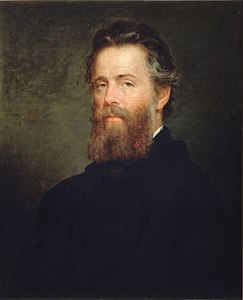Analysis of The March to the Sea
Herman Melville 1819 – 1891
Not Kenesaw high-arching,
Nor Allatoona's glen--
Though there the graves lie parching--
Stayed Sherman's miles of men;
From charred Atlanta marching
They launched the sword again.
The columns streamed like rivers
Which in their course agree,
And they streamed until their flashing
Met the flashing of the sea:
It was glorious glad marching,
That marching to the sea.
The brushed the foe before them
(Shall gnats impede the bull?);
Their own good bridges bore them
Over swamps or torrents full,
And the grand pines waving o'er them
Bowed to axes keen and cool.
The columns grooved their channels.
Enforced their own decree,
And their power met nothing larger
Until it met the sea:
It was glorious glad marching,
A marching glad and free.
Kilpatrick's snare of riders
In zigzags mazed the land,
Perplexed the pale Southsiders
With feints on every hand;
Vague menace awed the hiders
In forts beyond command.
To Sherman's shifting problem
No foeman knew the key;
But onward went the marching
Unpausing to the sea:
It was glorious glad marching,
The swinging step was free.
The flankers ranged like pigeons
In clouds through field or wood;
The flocks of all those regions,
The herds and horses good,
Poured in and swelled the legions,
For they caught the marching mood.
A volley ahead! They hear it;
And they hear the repartee:
Fighting was but frolic
In that marching to the sea:
It was glorious glad marching,
A marching bold and free.
All nature felt their coming,
The birds like couriers flew,
And the banners brightly blooming
The slaves by thousands drew,
And they marched beside the drumming,
And they joined the armies blue.
The cocks crowed from the cannon
(Pets named from Grant and Lee),
Plumed fighters and campaigners
In the marching to the sea:
It was glorious glad marching,
For every man was free.
The foragers through calm lands
Swept in tempest gay,
And they breathed the air of balm-lands
Where rolled savannas lay,
And they helped themselves from farm-lands--
As who should say them nay?
The regiments uproarious
Laughed in Plenty's glee;
And they marched till their broad laughter
Met the laughter of the sea:
It was glorious glad marching,
That marching to the sea.
The grain of endless acres
Was threshed (as in the East)
By the trampling of the Takers,
Strong march of man and beast;
The flails of those earth-shakers
Left a famine where they ceased.
The arsenals were yielded;
The sword (that was to be),
Arrested in the forging,
Rued that marching to the sea:
It was glorious glad marching,
But ah, the stern decree!
For behind they left a wailing,
A terror and a ban,
And blazing cinders sailing,
And houseless households wan,
Wide zones of counties paling,
And towns where maniacs ran.
Was it Treason's retribution--
Necessity the plea?
They will long remember Sherman
And his streaming columns free--
They will long remember Sherman
Marching to the sea.
| Scheme | abababcdadADefefexxdgdAd chchchxdadAd ijijixxdxdAd akakakldcdAd mnmnmncdgdAD cococoxdadAd apaxapldLdLd |
|---|---|
| Poetic Form | |
| Metre | 11110 111 110111 110111 1101010 110101 0101110 101101 01101110 1010101 11100110 110101 0101011 110101 1111011 1011101 001110101 1110101 0101110 011101 011011010 011101 11100110 010101 11110 010101 01011 1111001 110101 010101 1101010 11101 1101010 1101 11100110 010111 011110 011111 0111110 010101 1001010 1110101 01001111 011001 101110 0110101 11100110 010101 1101110 0111001 00101010 011101 01101010 0110101 0111010 111101 1100010 0010101 11100110 1100111 01111 10101 01101111 110101 01101111 111111 01001 1011 01111110 1010101 11100110 110101 0111010 111001 10101010 111101 0111110 1010111 0100010 011111 0100010 1110101 11100110 110101 10111010 010001 0101010 0111 111101 011101 111010 010001 11101010 0110101 11101010 10101 |
| Closest metre | Iambic tetrameter |
| Characters | 3,335 |
| Words | 494 |
| Sentences | 22 |
| Stanzas | 7 |
| Stanza Lengths | 24, 12, 12, 12, 12, 12, 12 |
| Lines Amount | 96 |
| Letters per line (avg) | 24 |
| Words per line (avg) | 5 |
| Letters per stanza (avg) | 328 |
| Words per stanza (avg) | 70 |
Font size:
Submitted on May 13, 2011
Modified on March 23, 2023
- 2:30 min read
- 195 Views
Citation
Use the citation below to add this poem analysis to your bibliography:
Style:MLAChicagoAPA
"The March to the Sea" Poetry.com. STANDS4 LLC, 2024. Web. 26 May 2024. <https://www.poetry.com/poem-analysis/19121/the-march-to-the-sea>.


Discuss this Herman Melville poem analysis with the community:
Report Comment
We're doing our best to make sure our content is useful, accurate and safe.
If by any chance you spot an inappropriate comment while navigating through our website please use this form to let us know, and we'll take care of it shortly.
Attachment
You need to be logged in to favorite.
Log In